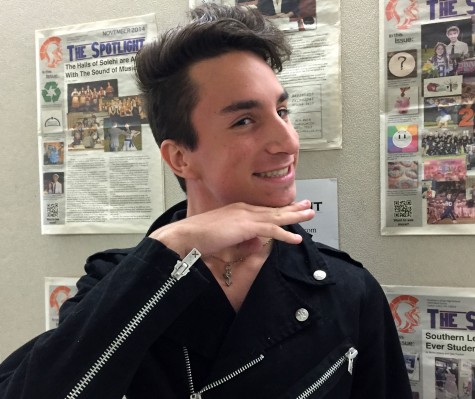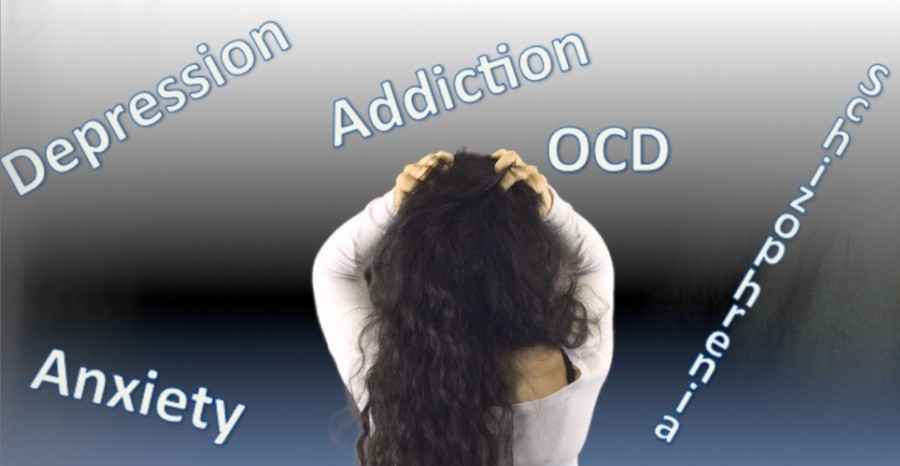Let’s Talk: Mental Health
When I first set out to write this article, I was preparing to write a criticism of the way the guidance office handles mental health. I always had the feeling that the administration was totally detached from mental health, and I felt as if trying to talk to someone about mental health would only result in frustration.
I wasn’t alone in thinking that. According to a small survey among the student body, 47.7 percent of the participants said they didn’t think that Southern Lehigh did a good job of handling mental health. However, after conducting some research, I think my criticism is a little undeserved.
I found that the guidance office tries to do what they can to help us out, and I’m sorry for my earlier judgment. Now, I’m certainly not saying that the mental health atmosphere is all rainbows and sunshine because, to be perfectly honest, it’s a bit of a mess. But that’s due to a bigger problem that goes beyond the work of a few guidance counselors.
Our society, including our school, suffers from a horrible stigma surrounding mental illnesses. Not only is the stigma inhibiting, but it’s toxic. Mental illnesses are often kept quiet, swept under the rug until someone commits suicide and we say, “That’s such a shame, I always thought he (or she) was so happy.”
“It’s a thing that you don’t talk about in society. You’re not supposed to bring up things like that; like it’s almost proper etiquette to not talk about that because it’s someone’s personal problems,” senior Gavin Sullivan said. “That’s the thing. You don’t know what someone’s going through until something happens. You have no idea they’ve been going through severe depression. It’s good to talk about this sometimes; you need to make people aware and make people know that it’s okay to talk about mental illnesses.”
The fact is that most people who don’t live with mental illnesses, or are not close with someone who has one, don’t understand what mental illnesses actually are. They picture what they see on tv, which is almost always one of two things: 1) A criminal whose crimes are excused due to him being “mentally impaired” or 2) feral patients who are locked in cells on overdramatized hospital shows. This leads some to equate “mental disorder” with “insanity.”
“I still will remember that last year when we were talking in health about mental disorders, the teacher had everyone go around the class and say what they first thought when they thought of mental disorders,” Sullivan said. “I’d say a good 80 percent of the class said, ‘They should be locked up in jail.’ I was in awe.”
Mental illnesses are real. Just because we can’t always see them doesn’t mean that they aren’t as real as a broken arm or the flu. They aren’t someone being too weak to deal with their problems or seeking attention. They come in all shapes and forms, and they can happen regardless of a person’s race, socioeconomic level, sexuality, or lifestyle.
Mental illnesses truly can affect anyone: the outgoing kid in class, your optimistic best friend, your teacher who seemingly has her life together. The possibilities are truly endless. They don’t all look the same and they can differ in their levels of severity.
“We look at the quiet girl who dresses in all black and seems moody and say, ‘Well she’s obviously suffering from depression,’ with no knowledge of the fact that it can be someone who’s seemingly upbeat,” English teacher Mrs. Lauren Tocci said. “We often have no understanding how those struggles can be masked or coped with in a real life setting.”
These negative stereotypes are ultimately incredibly damaging to those who live with mental illnesses because they make them feel as if they’ll never be accepted or successful in society. This often prevents people who desperately need help from getting it because they are afraid to admit to it. According to my survey, 57.5 percent of the students who participated said they would not feel comfortable talking to guidance if they had a concern about their mental health.
The guidance office has a number of resources for students who are in need of assistance. There are people who are genuinely concerned with the well-being of students, including the SAP team, a group of teachers who have been trained to assist students who are struggling.
“If a student sees [another] student that appears depressed or anxious, they can refer them to the Student Assistance Program. We [also]have our three counselors, myself, and the school nurse who are options for students who have a mental illness,” school psychologist Mr. Cotie Strong said. “We can help the students get them from their struggles to support. If some students are really struggling they may be recommended for an evaluation through me for special support.”
Despite this, there does seem to be a level of disconnectedness between the students and guidance. SAP is commonly joked about among students, and others fear that if they talk to the guidance counselors they’ll just receive a lecture on their grades.
There’s a very negative stigma to going and asking for help. You’re seen as the person who can’t deal with their own problems,” senior Maggie Boyer said. “As a whole, people don’t feel like the guidance counselors are the people that can help them. They think, ‘If I talk about it things are going to change for the worst.’ We need to make it known that the guidance counselors are there and you can ask for help, regardless of the situation. It should be ‘These people are here to help you and we’re going to do our best to help you.’”
So how can we stop this epidemic? The solution is education. To put it simply, Southern Lehigh must devote more time towards educating students on mental health and mental illnesses. While students do receive education in psychology and health courses, the lessons show extremely simplified versions of the disorders, placing them into categories for means of memorizing for an upcoming test. By being a basic part of a curriculum, mental illnesses aren’t being given the time and respect that they deserve.
“The only thing that I’ve ever seen the school do with mental health is that short chapter you learn in health class on the basics,” Sullivan said. “It doesn’t go super in depth, just they teach you this so you can do well on a test and then forget it a month later. They don’t teach you what it’s like living with a disorder, how to treat it, or how to show how they’re accepted in society.”
I understand that the school has to concern itself with standardized testing, college preparations, managing courses, and preparing students academically as best they can. However, students who live with mental disorders such as depression and anxiety often have a harder time coping with work and activities, and the stress of school piled on top of a mental illness can be destructive and will ultimately hurt academic performance. In order for students to be as successful as they can be, their mental health must be kept in check.
“Not educating students on mental health [prevents them from getting] the help they need, leading to hospitalizations, and even worse, suicides,” Liza J Alvarado, a local professional psychologist, said. “If kids are missing school or are having trouble focusing, they are not going to do their best academically. In the bigger picture, schools can’t afford to not educate kids on mental health issues.”
I don’t want this article to just be something that you skim over and then shove it in the back of your mind. I want this to be a call to action. Administration, guidance counselors, teachers, fellow students: we all need to play our part to eliminate the stigma of mental illnesses. The guidance office must ensure that students are aware of the many ways that they can assist them. Teachers must create an environment of awareness, acceptance, and help. The administration needs to make mental health a bigger priority.
“It is virtually impossible that [mental illnesses] won’t touch [students’] lives at some point, whether it’s them personally or someone else dealing with it,” Mrs. Tocci said. “The better educated students are, the more supportive they can be. If we can educate them now, think about the support that can happen later on in their lives.”
It is our responsibility as students to help facilitate conversation. We are the ones who friends turn to first in times of trouble. We can’t let their suffering go unnoticed. We have to learn how to talk to each other about the not-so-pretty things that we feel.
As cheesy as it sounds, we have to learn how to cultivate love and acceptance in our relationships with one another because we never know what someone else may be dealing with behind their smiles. If we don’t do this, and if we don’t challenge the stigma, we’ll never learn how to heal.
“You don’t have to understand, but be there for the person,” Boyer said. “Make sure that you know that you’re there for them and can be that person that can listen to them and talk to them if they need help. Make sure the people around you know that it’s okay to talk.”
If you are suffering from a mental illness, but are afraid to talk about it, know that it is okay. It is scary, but you are more than your illness. You are worthy of healing, hope, and love, and no matter how isolated you feel, you are never truly alone. Your story has the power to change someone’s world, and simply bringing awareness to this issue can bring a change to your life, and to others’ lives as well.
We all have to do our part to start the conversation. We need to create a community where it’s okay to ask for help, and where it’s okay to talk about the things that we feel. It’s such a simple thing: just turn to someone, point to this article, and ask them, “What do you think?” You might be surprised by what they have to say, and you might even learn something new.
For More Information, Visit:
Hotlines:
Crisis Call Center: 1 (800) 273-8255
Suicide Hotline: 800-784-2433
Or text “TWLOHA” to Crisis Text Line (Number: 741-741)

Throughout her four years at Southern Lehigh High School, Talia Trackim has surely established herself as the girl who does it all. She joined the Spotlight...

Devon Wolfe is a one-year staff member of The Spotlight where he has served as a photographer and technical assistant.
He will attend Northampton Community...


